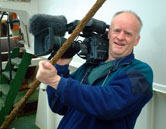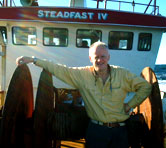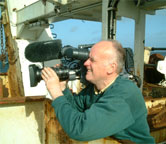I have always loved the sea, and going to sea in ships. Which is as good a starting point as any if you ever have the slightly deranged idea of wanting to go to sea in bad conditions on a fishing trawler. The idea had rumbled in my head for years, and then one day I mentioned it to David Strachan of Tern Television. We have known one another for years, and have made award-winning documentaries together.
David had already made a film, for the UK’s Channel 4 Television, on the early days of Britain joining the European Union and her fishing fleets signing up to the Common Fisheries Policy. The film revealed what an ineffective — and divisive — instrument the new EU fishing policies and in particular the fish quotas were becoming. Tern, based in Aberdeen in North-East Scotland (and at the heart of the fishing industry) had credibility and good contacts in the area. Additional funding also came from Scottish Screen in order that copies of the film could be preserved and be shown in museums and educational establishments.
The most important aspect was a passion to tell the story from the fisherman’s point of view. David and I both felt a sense of outrage that we — as in ‘we’ in Britain — have been happy to let the politicians off the hook for failing to support an industry that in other European countries is highly prized. We are the only island nation in the EU, we probably have the finest fish stocks, and yet we seem happy to let the asset and the industry, along with all its skills and its people, drift into oblivion. Make no mistake. The fishing communities believe that if their fleet falls below a certain level, other EU countries will stake a claim on their quotas of fish. If that happens, European trawlers will not use local Scottish markets, local harbors or support industries, and as a result whole communities that have survived on fishing for generations will decline and fall into an economic catastrophe. However, wanting to show their plight, and getting them to tell it, was another story. The fishing communities are generally suspicious of outsiders. The media rarely has the time, budget, or inclination to go to sea. Most take the easy line of portraying the fishermen like farmers — always complaining, never happy. They are also happy to peddle the ‘rapists of the sea’ line, presenting an image that the problems of declining stocks can be laid entirely at their own feet.
 The town of Fraserburgh, Scotland, at the heart of the fishing community, was our chosen base for the film. But during the good times a decade ago, heroin traffickers targeted some of the local crews coming ashore with money to burn. Problems still remain, but the town has been unable to shake off the media label of ‘junkie fishermen in the heroin capital of the North.’ So, if you turn up claiming to want to tell the story of the fishing crisis, there can be a far from friendly glint in their eye until they decide whether you are genuine or not. It took time. We were operating as a small unit — Producer-Researcher, Director-Cameraman, and Sound Recordist. Of all the boats that looked as though they might become involved in the de-commissioning story, only two skippers would even consider talking to us on-camera. Even after six months in the area, there were still some who would agree to meet you, and then never turn up.
The town of Fraserburgh, Scotland, at the heart of the fishing community, was our chosen base for the film. But during the good times a decade ago, heroin traffickers targeted some of the local crews coming ashore with money to burn. Problems still remain, but the town has been unable to shake off the media label of ‘junkie fishermen in the heroin capital of the North.’ So, if you turn up claiming to want to tell the story of the fishing crisis, there can be a far from friendly glint in their eye until they decide whether you are genuine or not. It took time. We were operating as a small unit — Producer-Researcher, Director-Cameraman, and Sound Recordist. Of all the boats that looked as though they might become involved in the de-commissioning story, only two skippers would even consider talking to us on-camera. Even after six months in the area, there were still some who would agree to meet you, and then never turn up.
What drove us on was the desire to get the camera into this secret world at sea. Years ago, one of my earliest documentary successes followed a story of miners trying to establish their own mine after the collapse of the nationalized industry in Britain. I found the same atmosphere of men hidden from sight in their own environment. The fishermen leave home and family for most of their lives, and go into a hostile world, dependent entirely on one another. It’s not a world they relish sharing with strangers. Our breakthrough came when Sandy West shyly agreed to let us follow his story. Better still was the moment when I first met his son, Zander. Young, fresh-faced, articulate, and with an almost na�ve ability to describe emotions and situations. We were up and running. As anyone who makes observational documentaries will know, half the fun (and terror) is not knowing which way your story will turn. Would Sandy’s boat be offered de-commissioning? Would he accept it? And what then? Would it be destroyed before our budget ran out? And so on …
These imponderables apart, as always it was the building of relationships that gave the greatest pleasure. Relationships that allow you to ask Sandy if we might bring a camera to his father’s funeral (I suspect rather like asking to film a private moment in the Amish community) and receiving his blessing despite possible murmurings from the locals. Relationships that meant Carol, the Cod Crusader, actually phoned us to tell of her marriage breakdown, and that she and her husband would like us to come right away because she would like it discussed on camera — without any suggestions from ourselves. Here too it must be stressed that the relationship with my principal sound recordist, Allan Young, is pivotal in building the confidence with our characters. As director, your head is often in many places when you arrive at a location, and Allan has a remarkable knack of settling people while I get camera and mind together. Luck too is something that plays a central role. How different our film would have been without the irony of the remains of the scrapped boat being bought by Thai fishermen. Or that a severe gale coincided with the de-commissioning voyage …
 Talking of storms at sea, we had four trips away, two in foul weather, two in good. Normally we shoot on the fully-fledged DigiBeta cameras, but the thought of that weight on my shoulder on a rolling deck brought about the decision to shoot on the lighter DSR 500 DVCAM. A great decision, and a great wee camera as we say in Scotland. Lighter or not, we still ended up in situations where, on reflection, the Health and Safety boys would have had a field day. But hey, that’s the fun of filming. Risk Assessments are for desk-bound folk.
Talking of storms at sea, we had four trips away, two in foul weather, two in good. Normally we shoot on the fully-fledged DigiBeta cameras, but the thought of that weight on my shoulder on a rolling deck brought about the decision to shoot on the lighter DSR 500 DVCAM. A great decision, and a great wee camera as we say in Scotland. Lighter or not, we still ended up in situations where, on reflection, the Health and Safety boys would have had a field day. But hey, that’s the fun of filming. Risk Assessments are for desk-bound folk.
And what of the people in the film? The Cod Crusaders are still pushing their mission to take back ‘our waters.’ Their plucky persistence even got them a private audience with the Chancellor of the Exchequer — Tony Blair’s Number Two. Sandy has gone back to sea, not as an owner, but as a skipper for hire, on an Irish trawler. He simply couldn’t get the salt and the cod out of his veins. Zander too is back fishing, this time with his cousin. He became bored out in the oil fields on standby vessels, but has still not found the happiness he deserves. A restlessness persists, despite a new baby. As to the fleet, the politicians, the European Union? The reality of levels of fish stocks will never be agreed by fishermen and scientists. Most stocks are declining, but the Haddock and Herring have surprised us by increasing. So who knows what will happen. One thing is certain: the small remote communities will still have little say in their own long-term future.
So, the film chronicles what may well be a losing battle for the small, family-run boats of previous generations. The profitable Pelagic fleet chasing herring and mackerel is limited to a small number of large boats now owned by a few shrewd local families who invested at the right time. Few of the white fish fishermen could now summon the financial muscle to build and license large boats if their sector of the industry goes the same way as the Pelagic. This year, the Scottish white fish fleet has not been hit so badly with enforced de-commissioning, but then they have already been decimated, so maybe they were due a rest. We also believe that the film caused a minor flutter in the breasts of politicians, causing them to pause for thought. In the end, I suspect “Gutted” will become a vital record of a moment in time, which brings both pleasure and sadness. At times during the making of the film there were moments of great emotion. You can’t get close to people over a period of time and not be affected. But the morning when the “Steadfast” sailed into the breaker’s yard was one of the most extraordinary moments in my career. The emotion on the bridge could have been cut with a knife. On two or three occasions that morning I found tears running down my cheeks as we filmed, particularly at the moment when young Zander unscrews the boat’s nameplate. His only memento from the boat that was to have been his future.
David Peat

